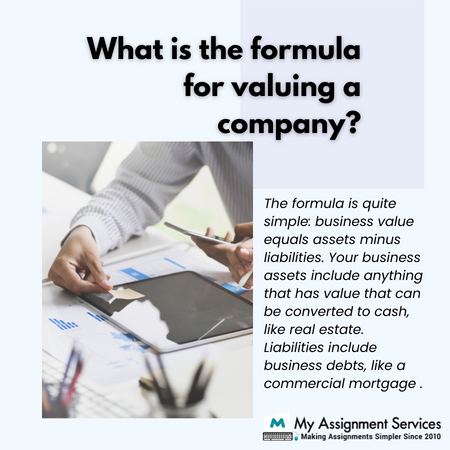How to Evaluate a Company

Every entrepreneur asks, "how much is their company worth?”. Many business owners, potential investors and even employees - small to large scaled companies - are interested in answering this question. Knowing the company’s value is important for business growth, especially when raising capital, trading shares, or applying for a loan.
Valuation of a company or business valuation includes calculating the net financial value of the company assets and the overall business. Every aspect of the firm must be evaluated to calculate the current economic worth of the organisation or a certain department. There are several for conducting a valuation - finding sale value and tax reporting.
The current industry value of the Agriculture industry in Australia is over 31 million AUD, a 17% rise since 2019-20. - ABS (Australian Bureau of Statistics)
So, how to value a company? Several aspects must be considered when determining a business's right market value. It is a necessary financial skill that every entrepreneur and business leader must-have. How do finance professionals convert assets to numbers? Read forth to find out.

What are the Main Valuation Methods?
It is similar to a complex mathematical problem. A company's financial value is mostly based on industry performance, vertical market, commodity or proprietary technology, and growth prospects. Adding the technological impact makes it more complex to derive the equation.
Hence, here are some business valuation methods that offer insight into a business's financial status:
Book Value
The most blatant way of determining the value of a company is by calculating the company’s book value by extracting data from the balance sheet. It is a very simple process, so it is often unreliable. The difference between the liabilities and assets offers the business equity.
Discounted Cash Flows
This method includes estimating the company’s value /investment as per the cash flow expected in the future. Discounted cash flow calculates the current value and future cash flows within the discount rates and the analysis period.
Market Capitalisation

If you wonder “how to value a company?”, then here is yet another straightforward and simplest method of calculating the company value of a publicly-traded business. The formula is to multiply the net shares by the current market share value.
Enterprise Value
Equity is the asset owned by the company after all its debts have been paid. When calculating the enterprise value, we sum up the company's equity and debt. Next, we subtract the unused fund from business operations.
Present Value of a Growing Perpetuity Formula
It is the ratio of the growing perpetuity equation with the company's present value. The increasing perpetuity is a financial tool that covers some money paid yearly and grows annually.
SME (Small and Medium-Sized Businesses) valuations reached an all-time high of 1.4 trillion AUD in June 2020, with more businesses seeking investors or buyers. - Smart Company
A business valuation may be performed for various reasons at different intervals. The most common need for evaluating a business is investment decisions, a potential sale or buyout, an exit planning strategy, and due to an impending IPO. There are several benefits to getting a company valuation so let’s learn about them in the next section.
Working through your assignments will require you to go through the various stages of researching, drafting, compiling your research papers, etc. It can get overwhelming to do all of it; you can get Financial accounting assignment help through free resources and affordable live guided sessions. Our experts can help you throughout the process of compiling your assignment. Enrol today!
What Aspects to Consider When Valuing a Business?
Hopefully, the question of how to value a business is answered. Now let’s move forward to answering the next question: Why should you know the value of your business? There are several benefits of calculating the value of your business. Here are a few of them:
Better Knowledge of Company Assets
It is absolutely important to conduct the business valuation assessment accurately. An estimated value is neither reliable nor acceptable due to its generalisations. Accurate value in numbers must be obtained to allow the business to get insurance coverage, investors, and a portion of the shares to profit.
Understanding of Company Resale Value
Business owners who wish to resell their company must know the economic value of their company as per the current market value. The process should be carried out long before putting the company for sale. Knowing the market value and the current market trends, the company's value will increase/decrease accordingly.
SMEs with nineteen or fewer employees have a 59 percent success rate. Whereas companies employing 20 to 199 have a relatively higher success rate of 75 per cent - the Australian Small Business and Family Enterprise Ombudsman
Obtain a True Company Value
Business owners have a general estimation of how much is their business worth. Still, it is important to know the actual value based upon criteria like stock market value, company bank account balances and total asset value. Knowing a company’s true value becomes the deciding factor for selling the company or shares.
Better During Mergers/Acquisitions
In the case of mergers and acquisitions, companies are required to show the true value of their company. With an accurate value at hand, companies can negotiate the merger and economic profits for each party.
Access to More Investors
When offered prices less than the market prices or if a company doesn’t see much scope in the deal offered by another company, they can reject the deal. Knowing your company’s worth can help gain more investors. Getting more investors is especially useful for avoiding a huge financial crisis.
How to Value a Company?
Suppose you intend to protect your company’s future through insurance or explore the value of a merger/sale agreement. Knowing how a business transfer operates is essential, especially for ones considering the company’s expansion plan or increasing the manpower.
You may use a business value calculator to estimate the price and discount value rate. Knowing this can help you comprehend the business's needs for increased profits. The formula for calculating the company's value is:
Business value equals assets minus liabilities.
Here,
- ROI is, Returns on investment
- Return is the final return that the company earned at the time of/right before the valuation.
- Investments are the current assets or the time value of money of the business.
The ROI must be higher to compensate for the high-level risk the new owner might be expecting. Investing in a high-risk business can potentially help earn more, but it also entails decreased value over a period due to the business' volatility.
The economic climate is constantly in a state of flux. Hence, various companies' financial status is influenced. Resulting in businesses seeking annual valuation to be desirable in the market. There are no set rules for a business to find value, but due to increased competition, businesses tend to find valuations to get more investors and profit.
Accounting and Finance students are assigned various tasks - class assignments, report composition, case studies, etc. You may find some difficulty due to a lack of sound knowledge. Get financial accounting assignment help from experts by filling out the enrolment form and accessing free academic resources.





